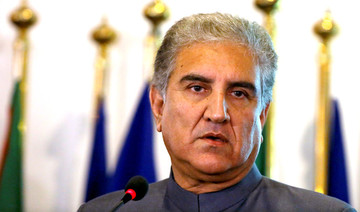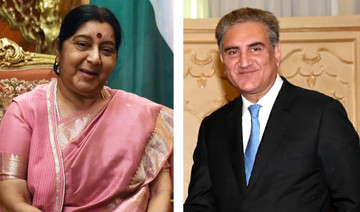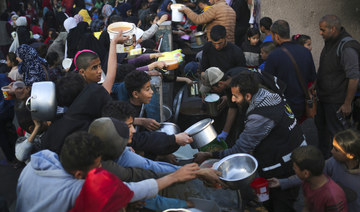NEW DELHI: India called off a planned meeting between its foreign minister and her Pakistani counterpart on the sidelines of the UN General Assembly session in New York this month, aggravating tensions between the longtime rivals.
External Affairs Ministry spokesman Raveesh Kumar said Friday India’s decision to pull out of the meeting, which had been announced just a day earlier, follows the killing of an Indian border guard in Kashmir and Pakistan’s glorification of insurgents fighting Indian rule in the Himalayan territory.
The Indian government’s decision to hold talks with Pakistan was strongly criticized by the Congress party and other opposition groups after rebels in the Indian-controlled portion of Kashmir killed the border guard and later raided over a dozen homes of police officers and abducted three. The bullet-riddled bodies of the three policemen were recovered Friday. India accuses Pakistan of arming and training the insurgents, a charge Pakistan denies.
The announcement on Thursday of the planned meeting had been considered an encouraging sign for restarting stalled talks between the nuclear-armed South Asian neighbors. Pakistan and India have fought two of their three wars since independence in 1947 over the disputed region of Kashmir, divided between the two countries but sought by each in its entirety.
Pakistan said it regretted India’s decision not to meet, with Foreign Minister Shah Mahmood Qureshi saying that “clapping can’t be done with a single hand.”
He said Pakistan wanted peace and stability in the region, but that India was perhaps more worried about “internal politics.”
“We want to get out of the past and we have taken a step forward but unfortunately India has taken a step back,” he said in Islamabad, the Pakistani capital.
Pakistan Information Minister Fawad Chaudhry said “an extremist segment in India doesn’t want to see Pakistan and India move ahead on the path of dialogue to resolves issues.”
The Indian spokesman said that New Delhi had agreed to hold the meeting in response to a letter from Pakistan Prime Minister Imran Khan to his Indian counterpart, Narendra Modi, stressing the need to bring positive change, a mutual desire for peace, and a readiness to discuss terrorism.
“Now, it is obvious that behind Pakistan’s proposal for talks to make a fresh beginning, the evil agenda of Pakistan stands exposed and the true face of the new prime minister of Pakistan Imran Khan has been revealed to the world in his first few months in office,” he said in a statement.
Any conversation with Pakistan in such an environment would be meaningless, Kumar said.
Pakistan’s Ministry of Foreign Affairs in a formal statement described the comments about Khan as “most unfortunate” and “against all norms of civilized discourse and diplomatic communication.”
Rejecting Indian allegations, the statement said the reasons cited by the Indian side for the cancelation of the meeting, within 24 hours of its public confirmation, were “entirely unconvincing as the alleged killing of BSF soldier took place two days prior to the Indian announcement of its agreement to hold the bilateral meeting.”
India’s relations with Pakistan have deteriorated since Modi came to power in 2014.
India calls off foreign ministers’ meeting with Pakistan
India calls off foreign ministers’ meeting with Pakistan
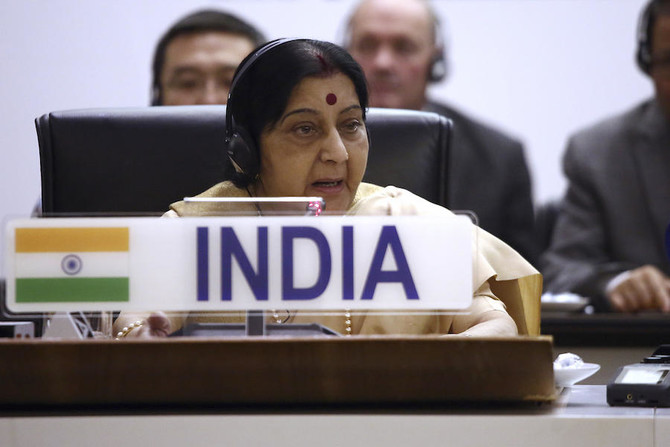
- The Indian government’s decision to hold talks with Pakistan was strongly criticized by the Congress party and other opposition groups
- Pakistan said it regretted India’s decision not to meet
Iran to release crew members of seized Portugal-flagged ship
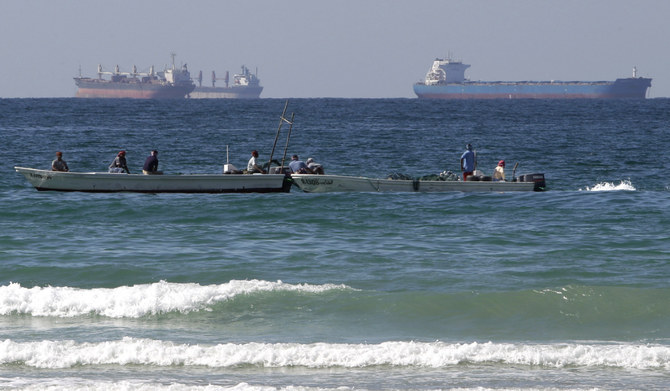
- The ship’s seizure took place hours before Iran carried out its first-ever direct attack on Israel, launching hundreds of drones and missiles
TEHRAN: Iran said on Saturday it would release the crew members of a Portuguese-flagged ship that its forces seized this month in the Gulf.
The Revolutionary Guard Corps took over the MSC Aries with 25 crew members on board near the Strait of Hormuz on April 13.
Tehran later said the ship belonged to its Israel and was being investigated for alleged violations of international maritime law.
“The humanitarian issue of the release of the ship’s crew is of great concern to us,” Iran’s Foreign Minister Hossein Amir-Abdollahian said in a phone call with his Portuguese counterpart Paulo Rangel.
BACKGROUND
The ship’s seizure took place hours before Iran carried out its first-ever direct attack on Israel, launching hundreds of drones and missiles.
“We have given consular access to their ambassadors in Tehran and announced to the envoys that the crew members will be released and extradited,” he was quoted as saying in a statement from his ministry, without elaborating.
Following the ship’s seizure, Portugal summoned Iran’s ambassador to demand its immediate release.
On April 18, India said one of the 17 Indian crew members had returned home and that the others were granted consular access.
“They are in good health and not facing any problems on the ship. As for their return, some technicalities are involved,” an Indian Foreign Ministry spokesman said on Thursday.
The ship’s seizure took place hours before Iran carried out its first-ever direct attack on Israel, launching hundreds of drones and missiles.
The Israeli military said nearly all of the projectiles were intercepted.
Israel and the US have denounced the seizure of the ship as an act of “piracy.”
Regional tensions have soared since war broke out nearly seven months ago between Israel and Palestinian militant group Hamas in the Gaza Strip.
‘World has never seen such a rapid increase in hunger,’ WFP regional director Corinne Fleischer tells Arab News
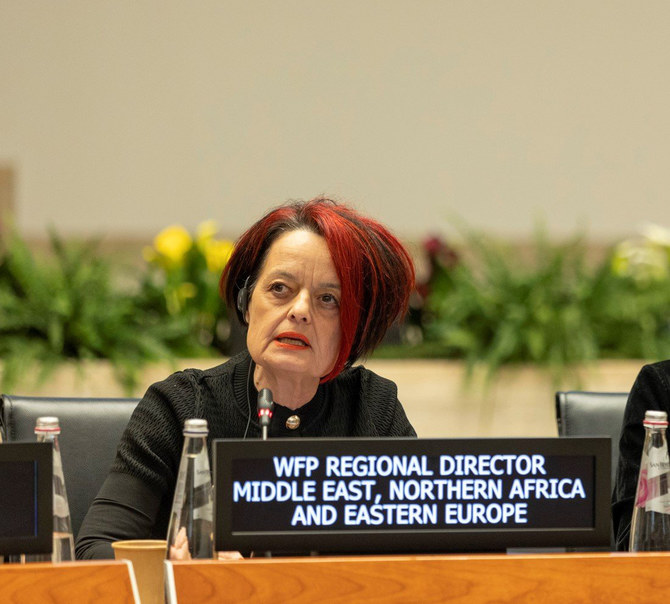
- Overlapping conflicts and residual pandemic effects have forced World Food Programme to reduce assistance, says top aid official
- Says Palestine, Ukraine, Yemen, Sudan and South Sudan stand to benefit from $10 million contribution by Saudi Arabia’s KSrelief
DUBAI: With budgets squeezed by rising prices and limited donations, humanitarian agencies are struggling to respond to the world’s multiple, overlapping crises, contributing to a rise in malnutrition, a top aid official has warned.
Corinne Fleischer, the World Food Programme’s regional director for the Middle East, North Africa and Eastern Europe, said that her agency had been forced to reduce its assistance to communities in several crisis contexts.
“This is due to conflicts, the impact of COVID-19, and the impact the Ukraine war has on food prices,” Fleischer told Arab News in an interview in Dubai. “Hunger is going up and governments are now looking at their own economies and needs.
“The humanitarian system is really challenged. It is a dramatic situation.”
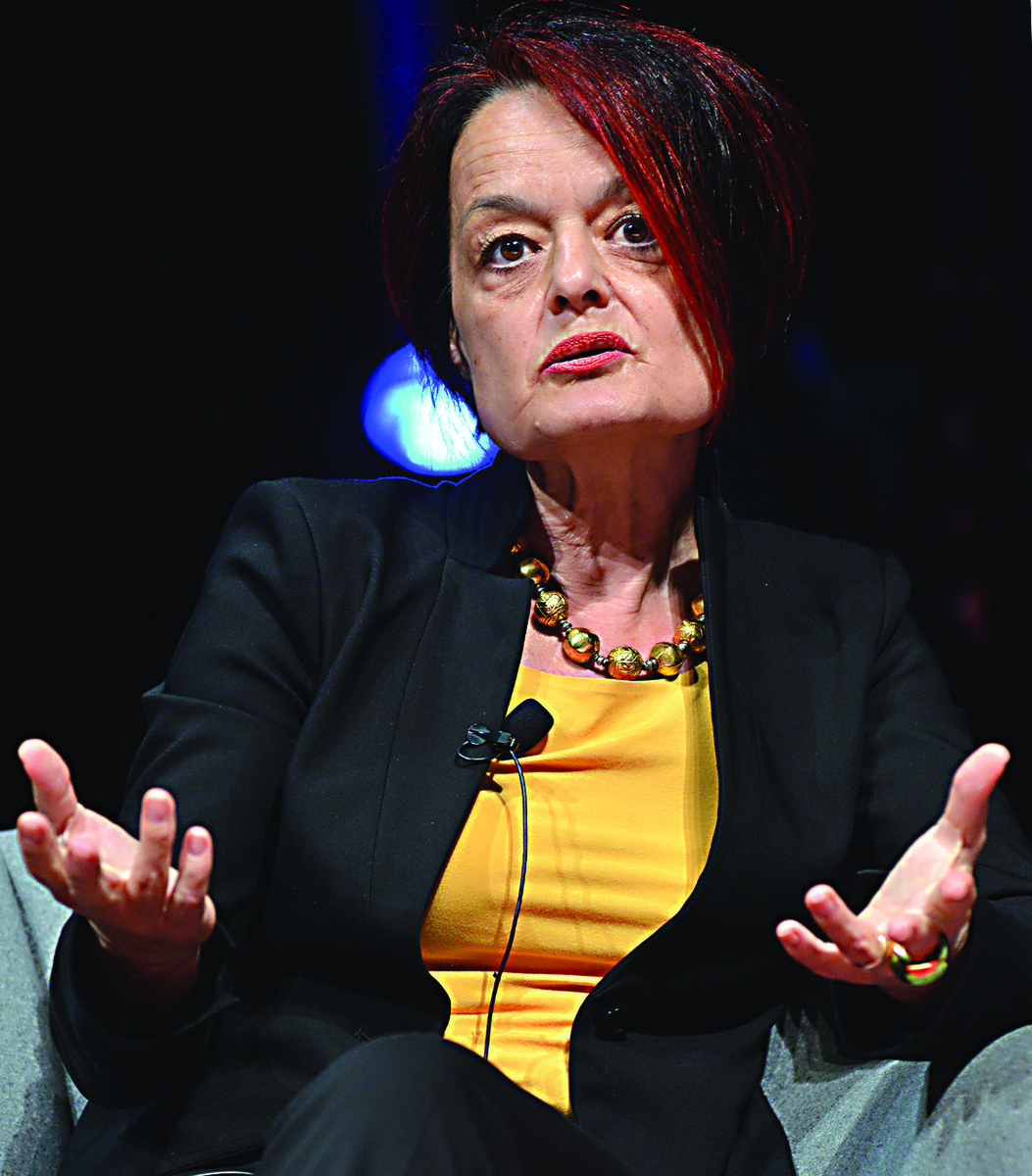
Fleischer, who recently held a meeting in Egypt with Dr. Abdullah Al-Rabeeah, supervisor-general of the King Salman Humanitarian Aid and Relief Center (KSrelief), said that WFP was very pleased to have strengthened its relationship with the Saudi aid agency.
“We signed an agreement where KSrelief will provide $10 million for our operations in Ukraine, $5 million for Palestine, $4.85 million to Yemen, and $1.4 million for Sudan and South Sudan,” she said.
“The focus of these contributions is of course saving lives and providing nutrition with a focus on mothers, pregnant and nursing mothers and young children under two.”
This additional financial assistance could prove lifesaving for the population of Gaza, which has endured months under Israeli siege.
More than six months after Israel launched its military offensive and placed tight restrictions on the flow of commercial goods and humanitarian aid permitted to enter the Palestinian enclave, the population has been brought to the brink of famine.
“I have never seen, even the world has never seen, such a rapid increase in hunger, where now 50 percent of the population is starving,” Fleischer said.
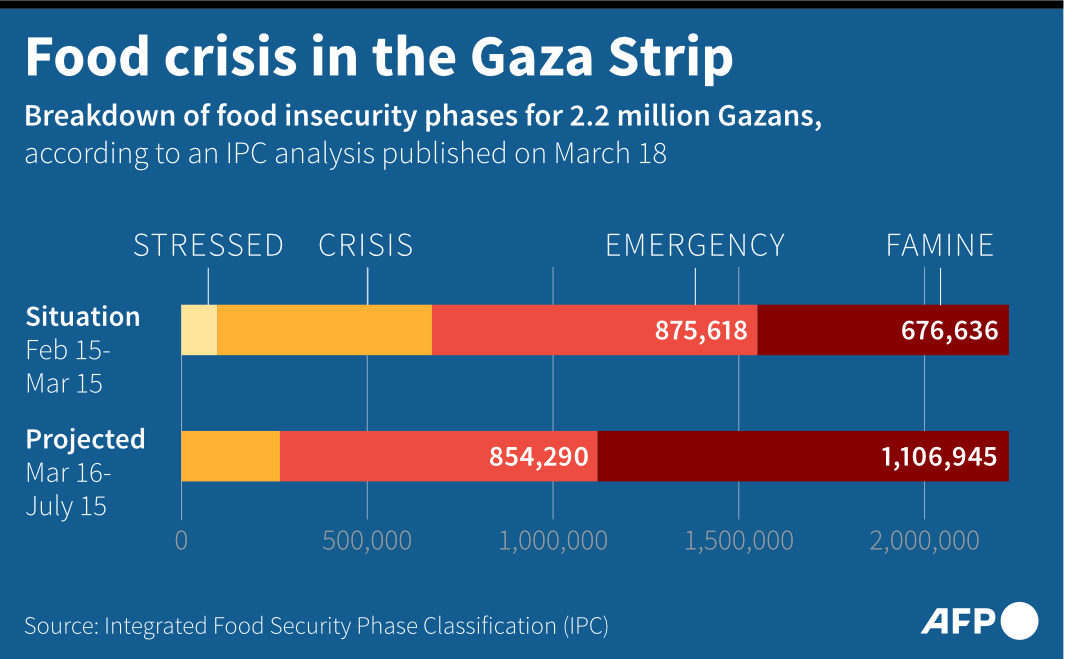
According to WFP figures, 0.8 percent of Gazan children were categorized as malnourished prior to the war. Just three months into the conflict, that number rose to 15 percent. A further two months later, it rose to 30 percent.
“From the beginning, we knew where the conflict might go, so we made sure we have enough food at the borders for 2.2 million people to be able to move in as soon as we can,” Fleischer said.
INNUMBERS
• 1.1 million Gazans experiencing catastrophic hunger — a number that has doubled in just 3 months.
• 1/3 Sudanese — 18 million people — facing acute or emergency food insecurity 1 year into the conflict.
• 900,000 Syrian refugees in Lebanon that WFP provided with food and other basic needs in February alone.
Although WFP continues to bring aid deliveries into Gaza, the number of trucks allowed in is far too limited to meet the needs of the stricken population. Some 500 trucks were entering the enclave prior to the war. Now barely 100 are permitted to enter — at a time when needs are at their greatest.
“We use the Rafah corridor, the Jordan corridor, which we’ve also set up, but the aid from there goes through Kerem Shalom and this is where the choke point is,” Fleischer said.
Kerem Shalom, which used to be the main commercial crossing between Israel and Gaza, has been repeatedly blocked by Israeli protesters demanding the release of hostages.
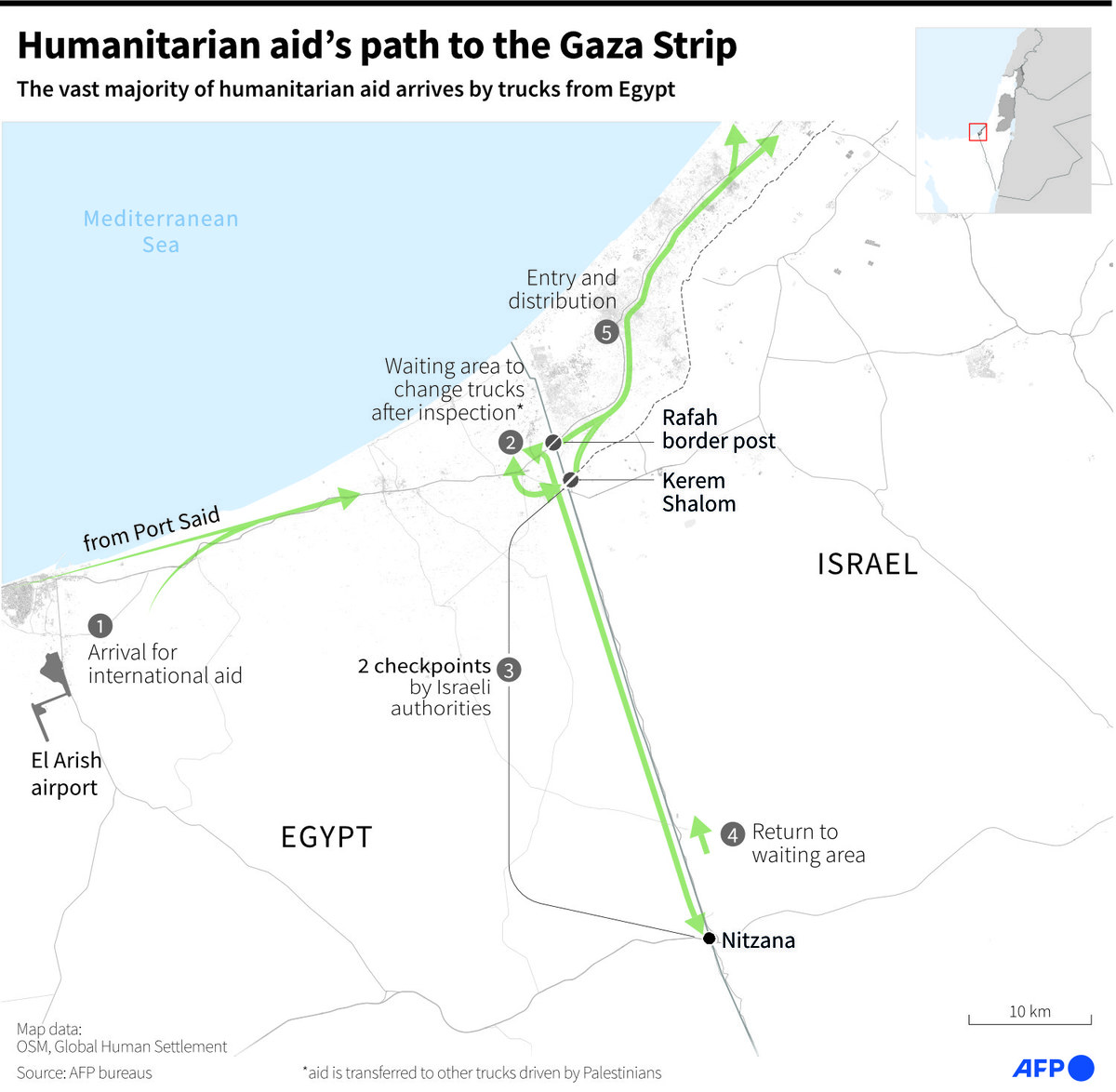
WFP has called on Israel to open more crossing points and is now able to go through the Erez Crossing. According to Fleischer, this has allowed aid agencies to access communities in the north of Gaza, where famine is taking hold.
“We managed in the last month to bring food for about 350,000 people,” she said. “That is not enough for a whole month, but it’s a start.”
Fleischer said that it was a good sign that they were now able to use other road routes within Gaza to distribute aid, such as the Salah Al-Din Road, the main highway of the Gaza Strip, where WFP now sends regular convoys, and the Port of Ashdod, one of Israel’s three main cargo ports.
“We are now able to send wheat, flour and other foods, and that is hugely important,” Fleischer said. “Ashdod is a functioning port. It will be able to get us directly into Gaza and into its north.
“While the signs are good now that more openings are being provided, it needs to be sustained. We still have famine on our watch from the six months of not being able to send in any aid, and let me tell you what that means besides giving statistical numbers.
“When we come with our trucks, people jump on them. Not only that, they open the boxes, they take the food and eat it first before they take the rest to their families. Can you imagine how hungry they are?
“That is disastrous and so we need to be able to bring this down, to give confidence to people that food is coming on a daily basis so they also are not attacking our trucks. We need this to be sustained at a much larger scale. There are 2.2 million people in Gaza that need food.”
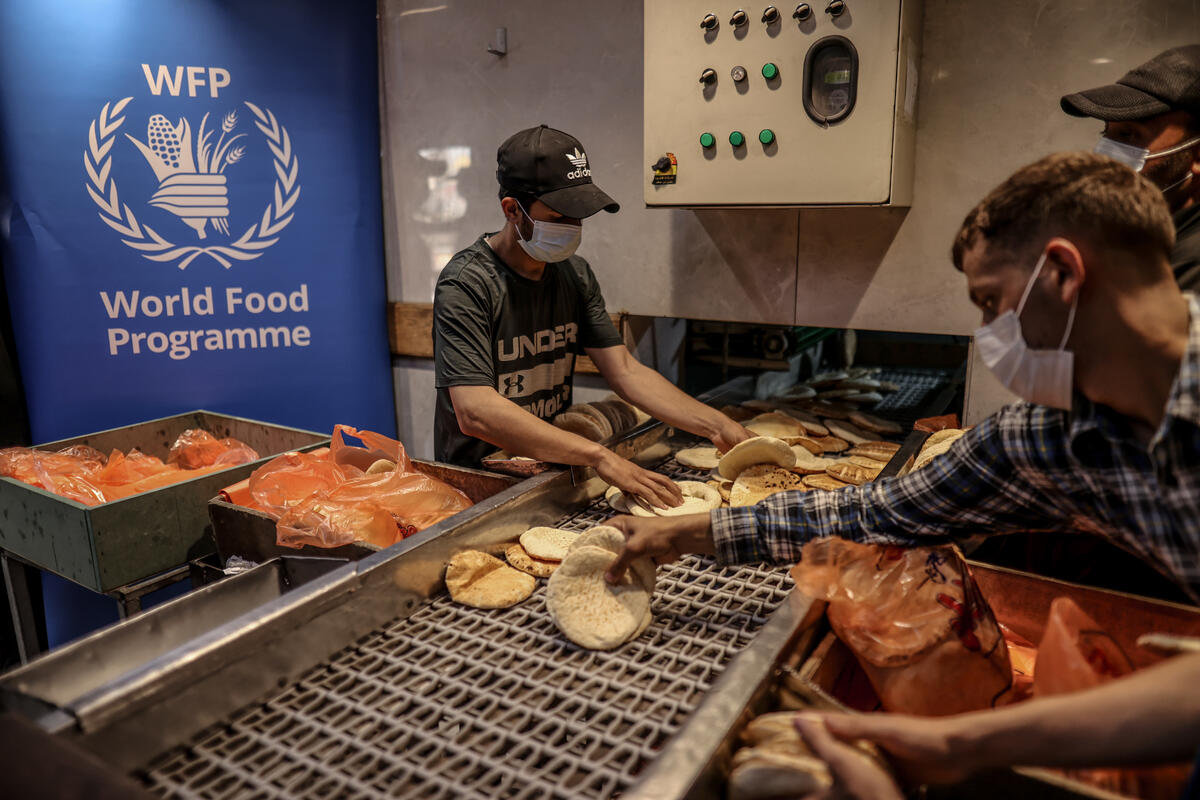
Fleischer said that private businesses such as bakeries must also be restored and reopened, as humanitarian agencies alone will not be able to sustain Gaza for the entirety of the conflict should it continue. WFP assistance has helped 16 to reopen.
“We are now restoring bakeries,” she said. “In the north, people haven’t eaten bread for a long time, and because we are able to go there currently, we are bringing fuel to bakeries as well as wheat, flour, yeast and sugar. So they’ve started operating again.
“We also have contacts with retail shops that we used before the war. Now we are working with them, we bring them our food and the parcels that we provide, and they distribute it, so they stay alive, they keep their workers, they open every day. So as soon as commercial food comes in again, they are ready.”
WFP has been touted as a potential replacement for the UN Relief and Works Agency as the primary aid agency working in Gaza after Israel raised allegations in January suggesting UNRWA staff had participated in the Hamas-led attack of Oct. 7, leading several donor nations to suspend funding pending an investigation.
“We cannot replace UNRWA. That is very clear,” Fleischer said. “UNRWA does much more than bring food to people. We are distributing food in camps that are managed by UNRWA. It needs to stay. That is very clear.”
Gaza is not the only hunger hotspot in the region, nor the only one that has seen the provision of aid by WFP dwindle owing to funding constraints — the worst the agency has experienced in 60 years.
These budget cuts have raised concerns among refugee host countries such as Jordan and Lebanon about the continuation of assistance. “This can really impact stability and what it means for the region,” Fleischer said.
“Syria is no longer at the top of the list now. Two years ago it was. But then came the Ukraine war and now we have Gaza. Do you know how this translates in terms of the assistance we provide to Syrians? We are the safety net for them. They don’t get much subsidies.
“We went from supporting six million people every month with food to three, to now one million within seven months because of lack of funding. The situation is desperate. And now you also see malnutrition rates going up there.
“I can tell you in Syria, when we announced those cuts, we had weapons at our distribution points, people were so desperate. We also reduced up to 40 percent of aid to refugees in Lebanon.”
And it is not just displaced communities that the agency has to support. Fleischer said that the number of Lebanese citizens requiring aid had also risen dramatically due to the country’s grinding financial crisis.
Fleischer said that WFP has been able to work with the Lebanese government and the World Bank to gradually integrate those citizens to receive state welfare.
In the south, however, where Israel and Lebanon’s Hezbollah militia have traded fire along the shared border since the conflict began in Gaza, the situation is different.
“We have supported 62,000 people,” said Fleischer, referring to the communities displaced by the cross-border exchanges. “These are both Lebanese citizens and Syrian refugees who have been impacted by the tensions in the south of Lebanon.
“However, if it escalates, the UN and the humanitarian sector will not be able to handle it at this rate. It will exceed the funding and assistance capacity.”

Last-gasp goal stretches Leverkusen unbeaten streak

- The strike keeps Leverkusen’s remarkable streak of late goals alive
- Alonso’s side have now won or equalized in stoppage time 10 times this season in all competitions
LEVERKUSEN, Germany: Robert Andrich scored with the last kick of the match to extend Bayer Leverkusen’s unbeaten run to 46 games this season with a 2-2 home draw against Stuttgart on Saturday.
With Bundesliga champions Leverkusen facing their first loss of the season in any competition trailing 2-1 late in stoppage time, Andrich hammered in a loose ball to equalize in the sixth minute of stoppage time.
The strike keeps Leverkusen’s remarkable streak of late goals alive, with Xabi Alonso’s side doing the same at Borussia Dortmund in the seventh minute of injury time for a 1-1 draw last week.
Two goals in the space of nine minutes to start the second half from Chris Fuehrich and Deniz Undav put Stuttgart on course, with Amine Adli pulling one back after 61 minutes.
Leverkusen built pressure but could not break through, putting their hopes of becoming the first team to go a full Bundesliga season without defeat in doubt.
However, with time running out, they won a free kick and Florian Wirtz curled the ball into the box, Andrich snapping up a rebound to score.
Alonso’s side have now won or equalized in stoppage time 10 times this season in all competitions.
Heba Ismail brings Saudi representation to NFT ecosystem
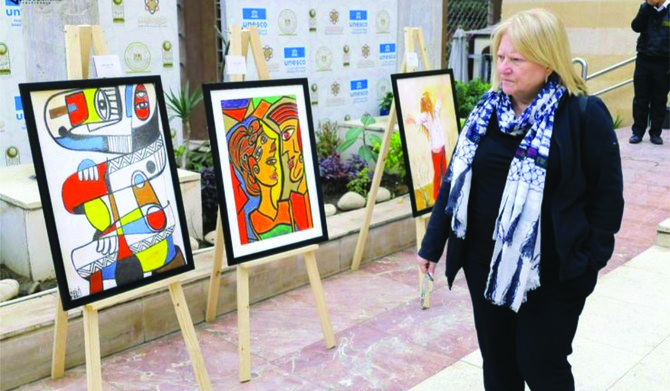
- Heba Ismail is highlighting ways for artists to flourish in the digital world
JEDDAH: Saudi artist Heba Ismail showcased her work at the Outer Edge Innovation Summit in Riyadh this week.
Commenting on her experience at the summit as one of the first Saudi artists to venture into the Web3 art scene, she said: “Having my paintings displayed on the event screens is a tremendous honor, offering global visibility and inspiring more Saudi and Arab artists to explore the diverse options available for sharing their art with the world.

“Through my participation with Nuqtah, the first Saudi NFT platform, I am eager to present my art on a global stage and connect with audiences in innovative ways,” she continued.
Non-fungible tokens — or NFTs — are, in this scenario, digital tokens that can be redeemed for a digital art work. Ismail is exploring their potential in the Saudi art scene.
HIGHLIGHTS
• With a professional background in dentistry, Heba Ismail found parallels between that meticulous work and her own creative process.
• Partnering with ChainVisory, a blockchain consultancy company, Ismail launched the Hebaism brand.
• It combines NFTs and original paintings, providing collectors with both digital and physical assets.
For Ismail, art has always been more than just a hobby — it’s been a lifelong calling. With a professional background in dentistry, Ismail found parallels between that meticulous work and her own creative process.

Inspired by movements including cubism, fauvism, and surrealism, Ismail’s art is a fusion of diverse influences and personal narratives “Each face represents a feeling and a vision documented on a painting. I paint poetry, and often times each piece is accompanied by a poem,” she said. “As a Saudi female, most of my paintings represent myself and my Saudi culture, which I am proud of. The characters are coded feelings, faces that tell a story — either joy, sadness, or acrimony.”

Her introduction to NFTs came in 2021, sparking a fascination with the technology and its potential. Partnering with ChainVisory, a blockchain consultancy company, Ismail launched her Hebaism brand, which combines NFTs and original paintings, providing collectors with both digital and physical assets.
As a female Saudi artist, I want to leave a mark and impact on every art platform, putting Saudi art on the map worldwide.
Heba Ismail, Saudi artist
“I wanted to keep the authentic classical painting process, yet the NFT world gave me a chance to meet and discover different ways to share my art and build a name and a brand,” she said. “It’s been an enlightening journey, uncovering the futuristic art process and connecting with a vibrant community through Web3.”
Ismail hopes to inspire other artists in the region to explore new avenues for artistic expression.
“As a female Saudi artist, I want to leave a mark and impact on every art platform, putting Saudi art on the map worldwide,” she said.
Who’s Who: Ahmed bin Ali Al-Suwailem, CEO of the National Center for Non-Profit Sector

Ahmed Al-Suwailem has been CEO of the National Center for Non-Profit Sector since 2022. He has over 20 years of experience in the public and private sectors, specializing in economics, trade, finance, and banking.
Al-Suwailem is responsible for developing the Kingdom’s non-profit sector, expanding its impact on social and economic development, and integrating government efforts in licensing, financial supervision, and coordination.
Prior to his current position, Al-Suwailem, at various times, served as CEO of the National Anti-Commercial Concealment Program at the Saudi Ministry of Commerce; as adviser to the Saudi Minister of Commerce; and as secretary general of the Riyadh Chamber.
He has also been head of management information systems in financial planning and control at Saudi Investment Bank, and executive vice president of financial control at Gulf International Bank.
Al-Suwailem currently also serves as managing director and board member at the Riyadh International Exhibition Center and is a board member of the General Authority for Awqaf and the Associations Support Fund, a trustee of the Riyadh Economic Forum, and a member of the executive committee for remuneration and compensation at the Riyadh Chamber.
Al-Suwailem holds a master’s degree in finance from George Washington University in the US and a bachelor’s degree in accounting from King Saud University in Saudi Arabia.
He is a certified management accountant and public accountant and holds a certificate in international financial reporting standards and accreditation in exhibition and conference management from the International Association of Exhibitions and Events.


